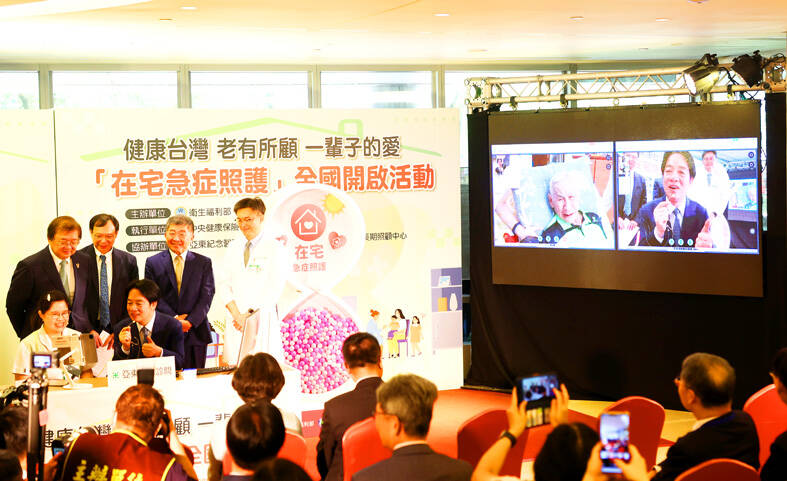President William Lai (賴清德) yesterday visited a hospital to oversee implementation of the “acute care at home” trial program after amendments to the Rules of Medical Diagnosis and Treatment by Telecommunications (通訊診察治療辦法) aimed at expanding telemedicine services took effect on Monday.
The amendments added five new categories of people eligible for telemedicine: those in a chronic care program, under hospice care, in correctional institutions or under disability care, or those receiving treatment for an illness or injury sustained in a disaster, an infectious disease or for other major incidents.
The pre-existing five categories of eligible people were those receiving post-acute care, long-term care, international medical care or home-based medical care, or people who have been admitted by a family doctor.

Photo: CNA
In all cases, they must either have received approval from the local health department or be included in the National Health Insurance bundled payment programs.
Lai yesterday visited Far Eastern Memorial Hospital (亞東醫院) in New Taipei City’s Banciao District (板橋) to observe the implementation of the new program.
Minister of Health and Welfare Chiu Tai-yuan (邱泰源) said Taiwan would become a super-aged society next year, meaning people aged 65 or older would account for more than 20 percent of the population.
The acute care at home trial program is expected to alleviate the burden caregivers face of having to take elderly patients to and from hospitals, by linking long-term care resources and bringing medical care to people at their homes or care facilities, Chiu said.
Lai, formerly a physician, said that when he was a resident doctor, some bedridden patients were brought by their family members to see him.
He said he also grew up in a remote township with limited medical resources, where doctors would send people medicine or voluntarily conduct free consultations.
That is why he wants to promote home-based healthcare services, Lai said.
The expansion of telemedicine services and the launch of the trial program can be seen as a milestone for Taiwan’s healthcare services, Lai said.
As technology advances, Taiwan must apply it to healthcare services to benefit the public, he added.
Demonstrating the telemedicine service, a nurse held a teleconsultation with a bedridden patient nicknamed Ah Hua (阿華). Lai stood to the side as a doctor encouraged Ah Hua to sit up and try to walk more often.
The program has teams of doctors, nurses, pharmacists and respiratory therapists providing integrated care to people who need antibiotic treatment for pneumonia, urinary tract infections or soft tissue infections, National Health Insurance Administration Director-General Shih Chung-liang (石崇良) said.
The patients can choose to be hospitalized or to receive home-based care using telemedicine, equipment to remotely monitor their vital signs and bedside testing, which would enable them to rest at home while receiving treatment, he said.
The trial program is expected to benefit about 5,400 people, he added.

CHAOS: Iranians took to the streets playing celebratory music after reports of Khamenei’s death on Saturday, while mourners also gathered in Tehran yesterday Iranian Supreme Leader Ayatollah Ali Khamenei was killed in a major attack on Iran launched by Israel and the US, throwing the future of the Islamic republic into doubt and raising the risk of regional instability. Iranian state television and the state-run IRNA news agency announced the 86-year-old’s death early yesterday. US President Donald Trump said it gave Iranians their “greatest chance” to “take back” their country. The announcements came after a joint US and Israeli aerial bombardment that targeted Iranian military and governmental sites. Trump said the “heavy and pinpoint bombing” would continue through the week or as long

TRUST: The KMT said it respected the US’ timing and considerations, and hoped it would continue to honor its commitments to helping Taiwan bolster its defenses and deterrence US President Donald Trump is delaying a multibillion-dollar arms sale to Taiwan to ensure his visit to Beijing is successful, a New York Times report said. The weapons sales package has stalled in the US Department of State, the report said, citing US officials it did not identify. The White House has told agencies not to push forward ahead of Trump’s meeting with Chinese President Xi Jinping (習近平), it said. The two last month held a phone call to discuss trade and geopolitical flashpoints ahead of the summit. Xi raised the Taiwan issue and urged the US to handle arms sales to

State-run CPC Corp, Taiwan (CPC, 台灣中油) yesterday said that it had confirmed on Saturday night with its liquefied natural gas (LNG) and crude oil suppliers that shipments are proceeding as scheduled and that domestic supplies remain unaffected. The CPC yesterday announced the gasoline and diesel prices will rise by NT$0.2 and NT$0.4 per liter, respectively, starting Monday, citing Middle East tensions and blizzards in the eastern United States. CPC also iterated it has been reducing the proportion of crude oil imports from the Middle East and diversifying its supply sources in the past few years in response to geopolitical risks, expanding

Pro-democracy media tycoon Jimmy Lai’s (黎智英) fraud conviction and prison sentence were yesterday overturned by a Hong Kong court, in a surprise legal decision that comes soon after Lai was jailed for 20 years on a separate national security charge. Judges Jeremy Poon (潘兆初), Anthea Pang (彭寶琴) and Derek Pang (彭偉昌) said in the judgement that they allowed the appeal from Lai, and another defendant in the case, to proceed, as a lower court judge had “erred.” “The Court of Appeal gave them leave to appeal against their conviction, allowed their appeals, quashed the convictions and set aside the sentences,” the judges